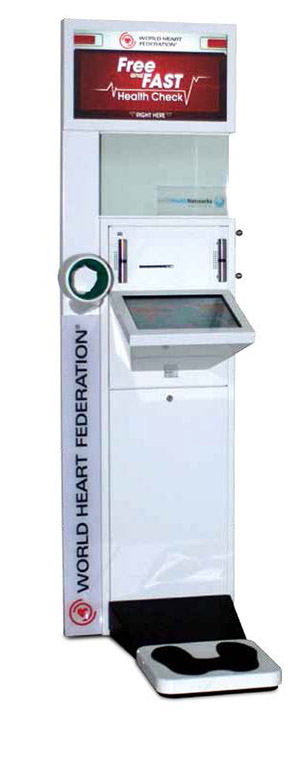Detroit Metro Adds Health-Oriented Retail Options & Self-Testing Kiosks
 With a sizable portion of airline travelers working to reduce their size, airports across the globe are responding with everything from calorie-conscious concessions to in-terminal workout facilities.
With a sizable portion of airline travelers working to reduce their size, airports across the globe are responding with everything from calorie-conscious concessions to in-terminal workout facilities.
In North America, Detroit Metropolitan Wayne County Airport (DTW) is at the front of the pack with numerous health-oriented initiatives, including plans to install a series of "health stations" that will allow airport visitors to measure their own blood pressure, body mass index and other key health indicators.
According to surveys conducted by Wayne County Airport Authority the last few years, 35% to 40% of DTW's passengers are interested in more services or amenities related to a healthy lifestyle.
 factsfigures factsfigures
Project: Health-Oriented Concessions Location: Detroit Metropolitan Wayne County Airport Retail Additions: Be Relax Spa, Z Market, Running Fit Concession Partners: HMSHost, The Paradies Shops Testing Kiosks: World Health Networks Tests Administered: Blood pressure, weight, body mass index, body fat content, heart rate Of Note: Health stations are installed at no cost to airport; tests are provided to airport visitors at no cost |
"These days, we hear from our passengers and see our passengers emphasizing healthy lifestyles and healthy living," says Peter Gargiulo, IAP, director of strategy management for the airport authority. "They are looking for healthier eating options and gravitate toward retail that has a healthier bend."
The airport authority kept local and societal trends favoring healthy options in mind when developing concessions for the new McNamara Terminal, notes Gargiulo.
Be Relax Spa is currently offering wellbeing and relaxation services such as massages, facials and oxygen therapy treatments to DTW patrons. Z Market, a partnership between locally-based Mills Pharmacy + Apothecary and HMSHost, is anticipated to open in the fall. Soon to follow will be Running Fit, an Ann Arbor athletic apparel and shoes concept expected to open under the Paradies umbrella in spring 2014.
Beyond Retail
While DTW has made great strides in appealing to its health-minded consumer base, Gargiulo reports that more initiatives are under review. DTW is currently negotiating an agreement with World Health Networks to install self-service "health stations" that provide non-invasive tests. The freestanding kiosks will allow airport visitors to measure their blood pressure, weight, body mass index, body fat content and heart rate. The stations focus on tests that allow for early detection of a number of risk factors related to heart disease and stroke.
"The health kiosk offered by World Health Networks fits in with the airport's desire to offer our passengers a variety of healthy amenities and services," explains Gargiulo.
The airport's first glimpse of the device was at Passenger Terminal Expo in Geneva earlier this year. In July, the airport authority began testing one of the stations in its administration building - a move that garnered enthusiastic response.
"For the first few days, the machine was in continuous use," recalls Gargiulo, noting the wide appeal of free tests in just three minutes. "From an employee standpoint, there was a tremendous response. When we put it in the terminal area where passengers have expressed that desire for healthy options, it is going to be a great fit."
With plans to install World Health Networks Health Stations in passenger areas this fall, DTW will be among the first deployments in the United States. John F. Kennedy International (JFK) in New York and George Bush Intercontinental (IAH) in Houston were the earliest U.S. adopters.
The initiative, which places health stations in airport free of charge, was recently launched globally, based on the resounding success of a pilot program conducted at Amsterdam's Schiphol Airport, explains Lon von Hurwitz, chief executive officer of World Health Networks.
Passenger usage at U.S. airports - an average of 500 users per week at each station - is far surpassing projections, reports von Hurwitz. Worldwide, more than 10 airports are actively evaluating the program, with Sacramento International and Mineta San José International among the stateside airports, he notes.
DTW's test experience is apparently typical. "The process for us is very straightforward," says von Hurwitz. "We bring a unit in, plug it into a conference area or lobby of administration headquarters, and the employees experience it for themselves for a few weeks. So far, in every case where we have done that, the airport has decided to go ahead and put it into the passenger side."
 Fatter Bottom Lines
Fatter Bottom Lines
World Health Networks has taken a very deliberate strategy to align itself with the mission of cardio societies around the world through the World Heart Federation in Geneva, explains Von Hurwitz. The federation works to lead the global fight against cardiovascular disease - primarily heart disease and stroke - via a united community of more than 200 member organizations from 100 nations. It is the only recognized cardiovascular, non-governmental partner of the World Health Organization.
From a financial standpoint, World Health Networks returns a royalty to the World Heart Federation under sponsorship underwriting that supports the federation's cardio educational efforts. Airports have the opportunity to earn revenue as part of the process via branding and sponsorships from likes of global healthcare leaders such as Johnson & Johnson and Merck - new and non-traditional sources for airport revenue, notes von Hurwitz.
Cross-promotion is another avenue for participating airports to generate additional revenue, he adds. World Health Networks has entered an agreement to pilot its health stations with Max Wellness-branded automated retail boxes in several airports, including JFK and IAH.
"Max Wellness was a perfect fit, because the boxes contain products for motion sickness, support socks and a lot of travel-related health and wellness items," explains von Hurwitz. "It became a natural marriage."
"We also have stand-alone locations, so the model is not to be vending box adjacency," he clarifies. "But that is an example of where we are ideally suited because those vending boxes are already driving revenue for the airports."
ZoomSystems Airport Account Vice President Mark Rickoff says that the placement of World Health Networks Health Stations near Max Wellness units in the C South Terminal at IAH and Terminal 5 at JFK have resulted in additional interest the self-service retail stores.
"We haven't seen tremendous revenue difference yet, but additional touches per machine," reports Rickoff, noting that graphic user interface screens measure where in the sale cycle people conclude the purchase or leave. "It is more important that the service is there, and hopefully it saves a life or two or three," he says.
Von Hurwitz sees similar commercial potential at DTW, especially given the airport's recent commitment to providing health and wellness options for its visitors. World Health Networks' testing stations could cross-promote healthy choices found within the McNamara Terminal's new concessions, he notes - perhaps pedometers or travel exercise equipment.
Gargiulo acknowledges the prospect for incremental revenue, but views it as a secondary factor at best. "There is certainly an opportunity for advertising or cross-promotion with other health-related products and services, and that is something we are working through in the agreement process," he explains, noting that the airport authority has not yet decided on the specific number or placement of stations it will implement. "The revenue is an added benefit - but for us, it is not the main selling point. Our primary reason centers around the healthy lifestyle component."

2022 Charlotte Douglas International Airport Report of Achievement
 Giving back to the community is central to what Charlotte Douglas International Airport and its operator, the City of Charlotte Aviation Department, is about, and last year was no different.
Giving back to the community is central to what Charlotte Douglas International Airport and its operator, the City of Charlotte Aviation Department, is about, and last year was no different.
Throughout 2022, while recovering from the COVID-19 pandemic, we continued our efforts to have a positive impact on the Charlotte community. Of particular note, we spent the year sharing stories of how Connections Don't Just Happen at the Terminal - from creating homeownership and employment opportunities to supporting economic growth through small-business development and offering outreach programs to help residents understand the Airport better.
This whitepaper highlights the construction projects, initiatives, programs and events that validate Charlotte Douglas as a premier airport.
Download the whitepaper: 2022 Charlotte Douglas International Airport Report of Achievement.








